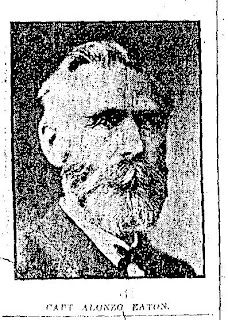Sometimes the most interesting ancestors are those who aren’t in our direct lines, but might be an uncle or an aunt or even an in-law. Although a focused genealogist might stick with the direct ancestry, I find myself drawn to anyone I come across who has a story that is unique in some way. It also helps whenever we have some documentation available, other than just census records every ten years and a rather unique name.
With that in mind I’d like to introduce you to Captain Alonzo Eaton.
Alonzo Eaton was born in Townsend , Massachusetts New Hampshire
He was the third child of Amos and Abigail Sherwin Eaton. Older brother Zimri was born 5 years earlier and another son, also named Alonzo, was born 2 years before our Alonzo, but died at just a year and a half old. It was common practice at that time to name a child after an older sibling who had passed away. Then, sadly, older brother Zimri would only live until just a few weeks past his 7th birthday, leaving Alonzo without any real memory of his older brother.
Tragedy struck the young family again when Abigail died at the tender age of 32, having already outlived two of her three small children. Amos was left with his grief and a 3 year old to raise alone. But, out of necessity, if not love, it was only a year later that Amos remarried. Hepsibah Simonds, a local girl, became Alonzo’s stepmother when he was a four year old. Amos and Hepsibah had 5 more children together and Alonzo would be 26 when his youngest brother, Ed’s great grandfather Albert, was born.
Amos, Alonzo’s father was a carpenter by trade in his younger days and Alonzo was a painter. The family moved from Townsend to Lunenburg and then to Fitchburg
When Alonzo was 19 he still lived at home with Amos and Hepsibah in nearby Fitchburg
Alonzo had quite the selection, considering four of these sisters were close to his age. It must have taken him a couple of years to decide which one he would choose, but at the age of 21 he married Ellen Willard, Josiah and Mary’s 3rd daughter, also 21.
Alonzo and Ellen started their family there in Massachusetts Ottumwa , Iowa Ottumwa
And this is where the really interesting part of Alonzo’s life begins. According to an article written in 1905 and published in the Fitchburg Sentinel, after moving to Iowa Alonzo “prospered there and was a leading citizen” until at 30 years old and an able-bodied young man, he found himself in the middle of a country at war with itself.
Alonzo, now the father of 4, entered the Union Army in the spring of 1861 after President Lincoln's second call for troops. He was instrumental in organizing Company K of the 2nd Iowa Volunteer Infantry. When he was elected Captain by the men in his Company, he declined the office knowing his close friend Charles Cloutman from New Hampshire wanted nothing more than to be Captain. So, Alonzo was elected 1st Lieutenant.
In his book Roster and Record of Iowa Troops In the Rebellion, Vol. 1, Guy E Logan writes:
To go to part II click on this link.
http://thehuntforhenrietta.blogspot.com/2011/01/halfway-uncle-alonzo-part-ii.html
Alonzo, now the father of 4, entered the Union Army in the spring of 1861 after President Lincoln's second call for troops. He was instrumental in organizing Company K of the 2nd Iowa Volunteer Infantry. When he was elected Captain by the men in his Company, he declined the office knowing his close friend Charles Cloutman from New Hampshire wanted nothing more than to be Captain. So, Alonzo was elected 1st Lieutenant.
In his book Roster and Record of Iowa Troops In the Rebellion, Vol. 1, Guy E Logan writes:
“Second Regiment had all reached Keokuk before the date indicated in the Governor's order. There they were mustered into the service on the 27th and 28th days of May, 1861. The regiment was fortunate in the selection of its first field officers, who soon justified the good judgment shown by Governor Kirkwood in appointing them, by the skill and ability displayed in preparing the regiment for active service in the short time which elapsed before they were ordered to take the field against the enemy. “
Just two weeks later the 2nd Iowa was ordered to proceed to Missouri Missouri and into Tennessee
There is a lot more to Alonzo's story and I don’t want you to lose interest, so I will continue it in next week’s Henrietta post. I hope you’ll come back to find out what it is that makes Alonzo so fascinating for me because I think you will also find him to be a very interesting character.

